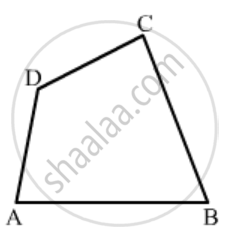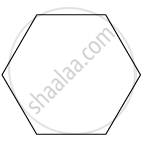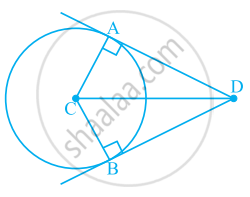Advertisements
Advertisements
Question
The angles A, B, C and D of a trapezium ABCD are in the ratio 3: 4: 5: 6. Le. ∠A : ∠B : ∠C : ∠D = 3:4: 5 : 6. Find all the angles of the trapezium. Also, name the two sides of this trapezium which are parallel to each other. Give reason for your answer.
Solution
As the trapezium ABCD is a quadrilateral,
∴ Sum of its interior angles = 360°
⇒ ∠A + ∠B + ∠C + ∠D = 360°
⇒ 3x + 4x + 5x + 6x = 360°
⇒ 18x = 360°
⇒ x = `360^circ/18 = 20°`
∴ ∠A = 3x = 3 × 20° = 60°
and ∠B = 4x = 4 × 20° = 80°
and ∠C = 5x = 5 × 20° = 100°
and ∠D = 6x = 6 × 20° = 120°
AB is parallel to DC.
∵ ∠A + ∠D = 180°
∠A and ∠D are co-interior angles whose sum = 180°
APPEARS IN
RELATED QUESTIONS
How many diagonals does following have?
A convex quadrilateral
In a quadrilateral, define of the following Diagonals .
In a quadrilateral, define of the following Adjacent angles .
Complete of the following, so as to make a true statement:
The number of pairs of adjacent angles of a quadrilateral is .......
In Fig. 16.19, ABCD is a quadrilateral.
How many pairs of adjacent sides are there?

Two angles of a quadrilateral are of measure 65° and the other two angles are equal. What is the measure of each of these two angles?
In a convex hexagon, prove that the sum of all interior angle is equal to twice the sum of its exterior angles formed by producing the sides in the same order.
Complete the following statement by means of one of those given in brackets against each:
If one pair of opposite sides are equal and parallel, then the figure is ........................
Mark the correct alternative in each of the following:
The opposite sides of a quadrilateral have
In a trapezium ABCD, side AB is parallel to side DC. If ∠A = 78° and ∠C = 120. find angles B and D.
Two diagonals of an isosceles trapezium are x cm and (3x – 8) cm. Find the value of x.
Observe the figure below and find out their name.

The angles of a pentagon are x°, (x - 10)°, (x + 20)°, (2x - 44)° and (2x - 70)°. Find the angles.
In a quadrilateral ABCD, ∠A = 72° and ∠C is the supplementary of ∠A. The other two angles are 2x – 10 and x + 4. Find the value of x and the measure of all the angles
Which of the following is not true for a parallelogram?
A quadrilateral can be drawn when all the four angles and one side is given.
Both the pairs of opposite angles of a quadrilateral are equal and supplementary. Find the measure of each angle.
A pair of opposite sides of a trapezium are ______.
What conclusion can be drawn from part of given figure, if DC is the bisector of ∠ADB, CA ⊥ DA and CB ⊥ DB?
Draw a rough sketch of a quadrilateral KLMN. State two pairs of opposite angles.
